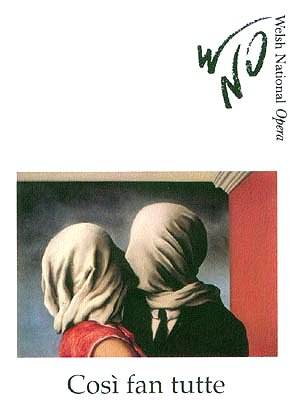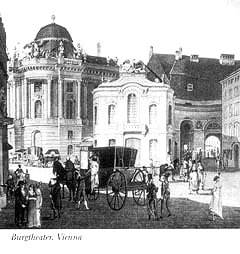Cosi fan tutte was first performed in Vienna on Mozart's 3oth birthday on 26.1.1790. It seems to have created problems for presentation ever since. Until recent times is was the least well-known of his mature operas; in the early 19th century even La clemenza di Tito, another problem piece, was more popular. The music of Cosi has long been admired; it is the libretto which has always been the stumbling block.In the background are the predicaments, still pertinent today, created by the changing social relations which were precipitated by the French Revolution. Hand in hand with social changes went industrialisation and urbanisation, creating increased movement of people, with more fleeting personal contacts and an up-rooting of established bonds. In this context the ideals of unchanging fidelity and trustworthiness can be seen as important anchors amidst turbulent conditions.
Uncertainty in human relations, and confounded expectations, can be deeply disturbing. Cosi fan tutte deals with disloyalty and untrustworthiness and the malleability of human emotions.
Mozart and his librettist, da Ponte, dared to confront the abyss opened up by shifting grounds and by betrayal. There is no easy, predictable and comforting resolution back into predestined paths. There are no heroes or heroines. Don Alfonso, the ruthless manipulator, and his assistant Despina achieve a hollow victory, the destruction of ideals.
Whereas a recent production of cosi fan tutte in Zurich (reviewed in S&H, February 2000) tried to embody the discomfort and confusion engendered by this text and Mozart's response to it, Calixto Bieito for WNO largely denies the turmoil of feelings, of betrayal and conflict, inherent in this 'School for Lovers'. The dangerous game played with human emotions is turned, very entertainingly, into a bawdy farce, thereby devaluing this complex work and sacrificing psychological depth and dramatic coherence.
The gendering of problems created by disloyalty could be rejected in our age of cosi fan tutti. We cannot accept that females alone are capable of being unfaithful. However, an important dimension is lost if the essence of the dilemmas is glossed over. Fiordiligi (Cara O'Sullivan) and Dorabella (Imelda Drumm) - and by implication all women - are seen not only to be unfaithful, but they seem capable also of rejecting a particular man in favour of a different other. This is metaphorically expressed by a sudden preference for a brown-haired fellow after a commitment to a blond one, and vice/versa. The uncomfortable conclusion, that individuals could be/are replaceable, loudly advocated by Despina (Linda Kitchen) but also inherent in the structure of the drama, is threatening and could undermine feelings of self-worth. In this production, fears of rejection and fears of loss, which underlie the cross-over, fail to make an impact. This Dorabella and Fiordiligi do not convince us that they are well brought up girls from sheltered backgrounds who will suffer dreadfully for their lapse of moral integrity.
Ferrando (Gregory Turay) and Guglielmo (Neal Davies), their fiancés, romp around the stage as macho cadets. They return in their disguises as gigolos, scheming to seduce the girls for our amusement. When they succeed, their distress at being betrayed is neither deep nor affecting, since they seem to lack the conviction that cosi non fan tutte.
Donald Maxwell conveys a frighteningly clear and venomous hatred of women as Don Alfonso who, like a cynical brothel keeper, organises the servant chorus into providing a sexually stimulating ambience to help the seduction along. Couples couple perfunctorily and he scatters money for their services liberally. Despina keeps the show on a level of a bawdy music hall romp, with such gestures as pulling a large phallic magnet from between her thighs to cure the poisoned suitors.
It all added up to an evening of boisterous fun, accompanied by glorious music, sung and played under Robert Spano to the high standards to which WNO has accustomed us. There were no weak performances. Cara O'Sullivan was fully equal to the heights and depths of the taxing role of Fiordiligi and Imelda Drumm had an attractive darker voice and stage presence which ensured that she was by no means upstaged by her sister. However, there was no way that the uncomfortable depths of this work could be sufficiently tapped within this interpretation.
The only counterpoint, hinting at serious and disturbing undercurrents, was provided by Alfons Flores' bleak and bewildering stage sets on, and against which, the action took place. The start of the opera, with a barrier of metallic boulevard café tables and chairs up front and across the whole width of the stage (many more than needed to accommodate the performers) created a desolate and soulless setting for the action. The non specific urban space, in- as well as outdoors, was devoid of any ornament.
The singers were made to negotiate, and at times do battle with, this barrier to our engagement, jumping on and off tables and chairs (with a predictable fall and, fortunately, miraculous recovery on this particular evening) seemingly haphazardly and they were required to throw and kick the furniture around noisily. This set not only demanded athleticism from the performers, but equal athleticism of mind from the audience to negotiate the meanings of this loose and un-endearing structure.
Could these scattered tables and chairs allude to unattached beings, hopping around scattered beds in a desultory fashion, empty of warmth and real connections? Is it a bleak reflection of a void created by cosi fan tutti suggested also by the WNO programme's enigmatic cover picture, Magritte's The Lovers (1928) who cannot look at each other?
Alexa Woolf


 Return to:
Return to: